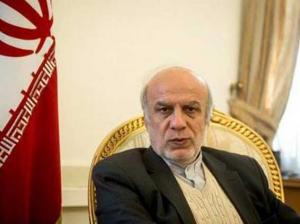 Tehran, Dec 27, IRNA - A senior foreign ministry official says Iran is planning to boost trade ties with the West once the sanctions are lifted entirely, adding that western countries themselves are very interested to invest in the 'attractive' Iranian market.
Tehran, Dec 27, IRNA - A senior foreign ministry official says Iran is planning to boost trade ties with the West once the sanctions are lifted entirely, adding that western countries themselves are very interested to invest in the 'attractive' Iranian market.Deputy Foreign Minister Ebrahim Rahimpour said, 'Both Iran and the West are interested in each other's markets and Tehran itself plans to strike a new balance in its foreign trade in the post-sanctions period,' he said in an interview with Trend News Agency on Thursday.
'Upon the success of the ongoing talks between Iran and the P5+1 (the five permanent members of the UN Security Council plus Germany) and with the signs of such success clearly evident, currently they (western states) are seriously studying Iranian markets, preparing for post-sanctions period as the nuclear negotiations continue,' he said.
He added, 'Once the western sanctions against Iran are removed, the Islamic Republic's annual foreign trade is projected to increase to $200 billion from the current level of $140 billion (including oil and gas).'
The deputy foreign minister for Asia and Pacific affairs, however, noted Iran will continue trade with its current partners to maintain their markets and will establish trade ties with interested countries after the sanctions are removed.
Iran and the six major powers (the United States, Russia, China, France, Britain and Germany) failed to meet a second self-imposed deadline in November to reach a comprehensive settlement to the long-running dispute over Tehran's nuclear work and decided to extend the negotiations on a final deal for seven more months until the end of next June. They held a new round of talks in Geneva, Switzerland this month.
Under an interim nuclear accord with the major powers, which was signed late last year in Geneva, Tehran agreed to temporarily scale down parts of its nuclear activities in exchange for a limited easing of sanctions.
Moscow Ties
Rahimpour commented on the trade between Iran and Russia and said both sides will benefit from boosting mutual economic and industrial ties considering the fact that they are under sanctions imposed by the West.
The volume of trade between the two countries has not been very high so far; however, Tehran and Moscow are at the beginning of a new period of cooperation, he added.
The official also said, 'Russia and Iran are studying to use their national currencies' in their bilateral trading.
Rahimpour touched on 'the high level' of relations with neighboring Azerbaijan and said the reciprocal visits of Azerbaijani President Ilham Aliyev and President Hassan Rouhani have helped settle many issues affecting the relations between the two countries.
'Currently, Azerbaijan and Iran implement a number of projects, and we hope that these projects will yield results soon,' he added.
In response to a question about alleged airstrikes by Iranian fighter jets in December on positions of Islamic State (IS) militants in Iraq, the diplomat neither denied nor confirmed those reports.
He rather chose to say Tehran spares no effort to help the Baghdad government and even Iraq's semi-autonomous Kurdistan region.
'We have already provided them with different types of support and will continue to do so as part of efforts to combat terrorism. It is the same (case) with regard to Syria. The world knows that we helped the Syrian government confront and fight terrorism,' Rahimpour noted.
By IRNA
The Iran Project is not responsible for the content of quoted articles.










